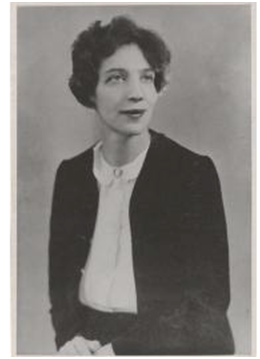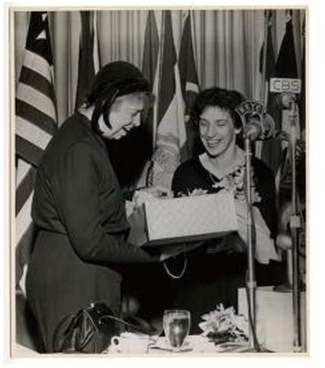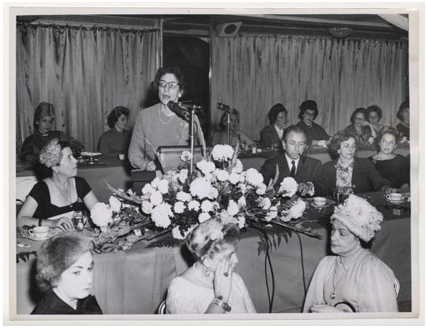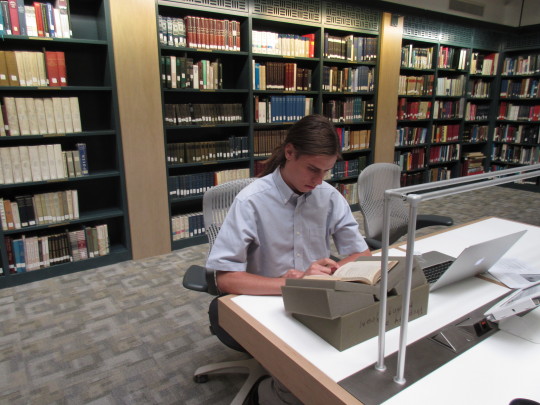By Poorvi Bellur
Part 2: Justine Wise Polier
Read Introduction;
Part 1 on Shad Polier
The daughter of AJC founder and prominent
rabbi Stephen S Wise, Justine Wise Polier rose to become one of the foremost
fighters for social justice and equality in legislation.

Justine Wise Polier (American Jewish Historical Society, Shad Polier Papers, Call #P-572)
Breaking barriers of
religion and gender, Polier became the first female judge in New York State at
the age of 32, and she served on the Domestic Relations Court under the mandate
of NYC mayor Fiorella H. La Guardia by 1935. Via her position of power as a
judge in the very legal system she sought to rectify, Polier worked throughout
her career to address systemic inequality and discrimination against
disenfranchised populations. The public sector and the rampant de facto
segregation it revealed led Polier to approach the issue of racial
discrimination with grassroots solutions. Recognizing the racialized narratives
of crime and poverty in urban New York, Polier helped to found the Wiltwyck
School for Boys, a school focused on admitting and providing shelter and
resources to delinquent black youth abandoned by the state. Polier was involved
in multiple cases involving segregation in education, including the Skipwith
attendance case (1958-1961) in which she found the Board of Education guilty of
practicing segregation in Harlem schools. Additionally in the class action suit
of Wilder vs. Sugarman (1971-78), Polier fought against welfare policies in
private and public foster care systems that marginalized black children.
In partnership with her husband and father,
Justine Polier was a voice for marginalized youth in the American Jewish
Congress, and also became well known for her friendship with Eleanor Roosevelt.

Eleanor Roosevelt and Justine Wise Polier at
membership event
(American Jewish Historical Society, American Jewish Congress records, undated, 1916-2006, Call #I-77, Box 761, Folder 23)
Polier’s correspondences with Roosevelt, held in the
collections of the American Jewish Historical Society (AJHS), range on a
variety of topics, from Polier’s advocacy for minorities to affectionate
exchanges between the friends and colleagues. The letters expose the sheer
number of different initiatives Polier was involved with as a part of her job
and her position as vice president of the AJC and president of the women’s
division. Some examples of the initiatives Polier was involved with from the
archives include an initiative to set up clinics for refugees out of all convalescence
resorts in the US, an investigation of discrimination and treatment of Mexican
youth in LA, a report on the Riis public housing project in Bedford-Stuyvesant
(a historically black neighborhood of New York City), and, in 1939, advocating
on behalf of Jewish children refugees from Germany.
On May 6th
1943, Polier wrote to First Lady Eleanor Roosevelt on behalf of the City Wide
Committee on Harlem for the organization of a Harlem Week, to invite her to
participate in the event; “"we all feel that if you would come as a guest
of honor and say a few words, it would mean a great deal to the work of the
Committee. We are hoping during the following week to publish material each day
on various aspects of Negro life in the city, which call for action by the
community. Last year, as a result of this kind of program, we were able to make
some real progress, particularly in the increased opportunities given to young
Negroes in such fields as nursing"[1].
Polier’s involvement with the Black neighborhoods of New York was considerable,
as reflected by a letter to Eleanor Roosevelt on January 18th 1945[2] referenced
the Council House, an establishment to house under privileged children in the
Bronx. An almost entirely black community, Polier writes of the House opening
up to black children and administration opening up to members of the
surrounding community itself Polier’s passion for and investment in Civil
rights is evident in this letter, as is her preoccupation with the grassroots
approach to economically empower disenfranchised communities.

Justine Wise Polier speaking at Women’s Division
event
(American Jewish Historical Society, American Jewish Congress records, undated, 1916-2006, Call #I-77, Box 738, Folder 25)
[1] Letter on May 6th 1943 from Justine Polier to
Roosevelt on behalf of the City Wide Committee on Harlem for the organization
of a Harlem Week, Justine Wise Polier and Eleanor Roosevelt correspondence
collection (1938-1972) Box 1, Folder 16
[2] Letter to Eleanor Roosevelt from Justine Polier on January 18th 1945,
Justine Wise Polier and Eleanor Roosevelt correspondence collection (1938-1972)
Box 1, Folder 3


